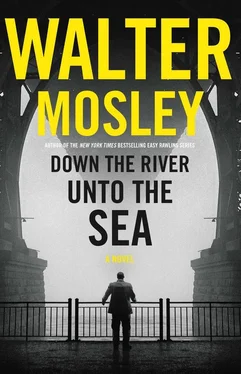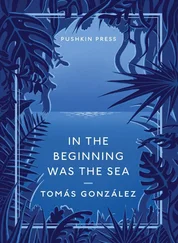I wondered what the former Nathali imagined when she thought of God or what the deity might have envisioned when considering his sinful, repentant acolyte.
For my part, whenever I closed my eyes I was in that lightless cell again. It smelled of piss and sweat. Fluttering insects flew through the darkness. Men groaned and complained beyond the sweating metal door of my detention.
A silver bell sounded.
Opening my eyes, I was looking out the second-floor window onto Montague Street again. It was November, but the cold hadn’t set in yet. The sun was shining brightly. A woman stopped across the street and, looking up, saw me.
The silver bell sounded again and I roused myself, turning away from the glare of the happenstance pedestrian. I ambled into the receptionist’s room, which my daughter occupied every day after school.
The front door to the office was locked, of course. I only ever felt secure behind locked doors.
The electronic eye above the hall-side doorsill transmitted an image to the small monitor panel on the wall. It was a slender young white woman, dressed in blues and whites. Her dress was only vaguely businesslike. She was carrying a brown leather briefcase and pulling a carry-on gray fabric travel bag.
Looking up at the lens, she had the beauty of youth... and the sorrow too.
“Who is it?” I said into the speaker system.
“Willa Portman. Is this the detective Joe Oliver?”
I pulled the door open and she gasped as if something shocking had happened.
“We had a four o’clock, right?” I said.
“Y-yes. I’m a few minutes early.”
“I have a friend who always tells me that whenever he gets there he’s right on time.”
She smiled and, pulling the wheeled travel bag, walked into the office.
“Right this way,” I said, gesturing toward my private door.
“Where’s Aja?” my prospective client asked.
“She’s a high school student, should be in any minute.”
Willa gave me a worried look but then went through the door to my office.
My workplace is a fairly small room with a high white plaster ceiling and one huge floor-to-ceiling window. The walls are brick and the floor dark wood. My desk is an ash table with no drawers. I don’t keep supplies or records in my office; Aja’s much larger room is the repository for files and office materials.
“Have a seat,” I said to the nervous girl.
She considered the request a moment, then sat on one of the ash chairs set out for visitors.
“It’s an unusual office,” she said, her head moving from side to side.
“Why are you so jumpy?”
“Um. I don’t know, I mean, I guess being here means that I’m really going to do this. You know when you just think about doing something it still isn’t quite real.”
“I know what you mean,” I said with more feeling than I intended.
Willa, I believe, heard the honesty in my tone, and this seemed to relax her.
“My name is Willa Portman.”
“You said that already.”
“I’m an intern doing research work for Stuart Braun.”
“Stuart Braun. Now, that’s a big deal.”
“Yeah,” she said through a sneer. “He is a big deal, a very important lawyer for those people no one else cares about.”
Stuart Braun was the radical lawyer-celeb who was representing A Free Man, a black militant journalist who had been arrested for the killing of two police officers three years earlier. Born Leonard Compton, Man was found seriously wounded a few blocks from the shoot-out, in the Far West Village. The gun he had on him was the one used in killing the officers. The bullets had passed clean through his body, so the guns that shot him could not be identified.
Man refused to implicate anyone else who might have been with him that night and denied having anything to do with any murders. He was facing the death penalty, which New York State provides for cop killers. He showed no remorse and, in general, refused to cooperate with the police or prosecutors.
Before Braun got involved it seemed pretty clear that New York was going to have its first execution in a very long time.
The Braun Machine, as it was known, took the case to a new level. An appeal was granted after Braun showed that much of the evidence against his client had been circumstantial and his publicly assigned lawyers were incompetent. Newspapers suggested that a self-defense plea was in the making. Protests proclaiming “Free Man” were being held from coast to coast.
I wasn’t a fan. When it came to cops as victims I was just another brick in the Blue Wall. Few civilians understood how hard it is to be a policeman when almost everybody is afraid of you and suspicious too. The mayor, the city council, and half the civilian population were willing to believe the worst of us when we put our lives on the line 24/7.
Us.
I still considered myself a cop. In my days on the force I’d been sucker-punched, stabbed, spit on, shot at, and singled out by a thousand videophones. Every time I’d make an arrest the community seemed to come out against me. They had no idea how much we cared about them, their lives.
“So are you a lawyer, Ms. Portman?”
“I passed the bar this past June,” she said. “But I’m working for Braun because he does the kind of work I want to do.”
“And what does Stuart Braun want from me?” I asked.
“Nothing.”
“Then why are you here?”
“I’m here because Mr. Man is innocent and Stuart Braun is about to sell him down the stream,” the young woman replied.
“River,” I said.
“What?”
“The saying is ‘sell him down the river.’ ”
“Oh.” Willa looked at me with both desperation and anger in her eyes.
“I thought Braun had committed himself to saving Man,” I said.
“He had,” she said, “at first. He gathered all kinds of evidence against the cops that Manny shot—”
“He’s admitted to the murders?”
“N-no,” Willa Portman stuttered. “I mean, yes, but not the way you’re saying. They were trying to kill him. They were stalking him. They’d already murdered three of his blood brothers and paralyzed the other one. They were after him and he just protected himself.”
She’d been looking around while making these claims but ended the sentence by looking into my eyes.
“So,” I prompted, “Braun was gathering evidence...”
“He had days and times, ballistics reports, and testimony from reliable witnesses who could be vetted.”
“Sounds like a case.”
“It was. It is. But then, two weeks ago, Stuart, I don’t know... he turned cold. There really isn’t any other way to say it. We were supposed to go see a church lady named Johanna Mudd. Ms. Mudd had agreed to testify that Officer Valence received payments from Deacon Mordechai to provide access to young homeless people for the purpose of forced prostitution.”
“Run out of a church?”
“The Last Rite of Christ Baptist Church ran a charity that was supposed to help runaway and orphaned girls and boys. Mordechai and some of his friends had the access. Valence, Officer Pratt, and others ran the business.”
“So that’s the defense?” I asked. “That Man and his crew were fighting a prostitution ring?”
“Not just that,” she said. “Not just that. Manny says that the cops were involved in all kinds of criminal activities. There was stolen merchandise, drugs, and murders. People were being killed if they tried to stand up to them.”
“But then one morning the Honorable Mr. Braun went cold, you say.”
“I asked him when we were going to leave to see Ms. Mudd, and he said that we weren’t. I asked why, and he told me that everything A Free Man had told us was a lie; that he was the one who had killed his blood brothers because they were going to turn in Valence and Pratt.”
Читать дальше









